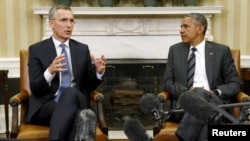U.S. President Barack Obama cited Russia’s “increasingly aggressive” posture with respect to Ukraine Tuesday, as he and NATO Secretary-General Jens Stoltenberg discussed the challenges facing NATO as it works to protect alliance members.
The NATO chief’s visit to the White House came on the same day that thousands of Russian troops and hundreds of Russian warplanes began a massive exercise in the country’s northwest that coincided with NATO’s long-planned maneuvers in the Arctic region.
President Obama and Secretary-General Stoltenberg on Tuesday discussed the situation in Ukraine, with respect to Russia, including the steps NATO has taken to ensure the security of alliance nations, particularly frontline states.
"I was pleased to hear that not only the United States but also our other NATO allies have been doing what’s necessary to make sure that we have positioned the resources and assets necessary to protect all NATO members," said President Obama.
Both leaders reaffirmed support for Ukraine’s sovereignty and called on implementation of the peace agreement reached in Minsk. Stoltenberg urged Russia to stop supporting separatists and remove all its forces from eastern Ukraine.
The NATO secretary-general also noted the creation of the alliance’s Very High Readiness Joint Task Force following last year’s summit in Wales, and said the alliance is prepared to confront new threats coming from both the east and the south.
“This is the biggest reinforcement of our collective defense since the end of the Cold War. And we are also setting up command-and-control units in all the eastern ally countries, underlining that NATO is present, NATO is there to protect and defend all allies," said Stoltenberg.
White House Press Secretary Josh Earnest said Tuesday Russia’s most recent military exercise was not a particular surprise, but that the United States would keep a close eye given the current situation in eastern Ukraine.
“It is something that we closely monitor for any impact that it might have on the safety and security of NATO allies," said Earnest.
Tuesday’s talks at the White House were not limited to Russia and Ukraine.
President Obama and Secretary-General Stoltenberg also focused on challenges “on the Southern front,” including coordinating in the fight against the Islamic State militant group, capacity-building in Iraq and ensuring that security forces in Afghanistan have the support they need to protect their own country.
Meawhile, hundreds of Russian warplanes and thousands of troops began a major military exercise Tuesday, coinciding with Arctic maneuvers by NATO forces.
The separate exercises come at a time of increased tensions between Russia and the West.
Defense Minister Sergey Shoigu said Russia has committed 12,000 troops, up to 250 military jets and hundreds of other weapons to this week's "tactical exercises." Russian media accounts said the maneuvers were meant to simulate the military response to an attack from abroad, by rapidly redeploying troops to stage counterattacks.
Russia's exercises stretch from the Volga River to Siberia, and are due to last three days. They are seen as a preliminary to a larger round of war games later this year.
NATO's Arctic Challenge Exercise 2015, which has just begun, follows pledges of closer military cooperation by countries where Russia has recently increased its air forces' activity. The nine countries that have seen a rise in Russian air and naval movements near their borders include the five Nordic nations: Denmark, Finland, Iceland, Norway and Sweden.
The Nordic maneuvers are being carried out by 4,000 military personnel and 100 fighter jets from the United States and eight European nations. They will continue until June 4; the following day, the Western alliance's annual Baltic operations exercise will bring together 4,500 troops from 17 member states.
Russia stepped up exercises
Russia's military has intensified drills and maneuvers since Moscow annexed the Crimean peninsula in 2014 and has become increasingly involved in the ongoing armed conflict in eastern Ukraine. Most analysts say that relations between Russia and the West are at the lowest point since the Cold War.
Poland and the three Baltic countries – Estonia, Latvia and Lithuania – have increased military spending and have asked NATO allies, particularly the United States, to step up their presence. NATO is already conducting air policing missions in its Baltic members bordering Russia.




